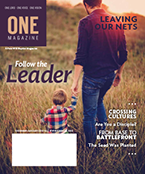
December-January 2016
Follow the Leader
------------------
|






Building an Equal Opportunity Church
By Timothy York
On July 26, 1990, President George H.W. Bush signed the Americans With Disabilities Act (ADA) into law. One of the drafters of the original bill, Robert Burgdorf, Jr., said, “The ADA is solely about ‘equal opportunity’…”
The heart of this legislation was to level the playing field for people with disabilities, because everyone should have the opportunity to contribute to society.
The tendency to only allow those who are “whole” an opportunity to contribute is not only found in corporate America or third-world countries; it is also found in the church. Sometimes, it seems as though the modus operandi of the typical church is that only paid ministers and “elite” mature laity are given equal opportunity to contribute significantly to Kingdom work. Admittedly, some fulfill a narrow and precise function within the Body of Christ in contrast to others who are given broad responsibilities.
This was the Apostle Paul’s exact point in Romans 12:3: “For I say, through the grace given unto me, to every man that is among you, not to think of himself more highly than he ought to think; but to think soberly, according as God hath dealt to every man the measure of faith.” All are given some, although some are given more.
The context of Romans 12 is Paul’s dissertation on spiritual gifts. He explained that “reasonable service” to Christ is the logical response to the forgiveness we receive. However, he went on to encourage us to provide our personal service to God through the Body of Christ. Paul continued in verses 4 and 5 by saying, “For as we have many members in one body, and all members have not the same office: So we, being many, are one body in Christ, and every one members one of another.”
Because Christian service is the expectation for every believer, we are to complete this task as a unified body, not as freelance operatives. Why then, does the church refrain from using all her resources, but seems to prefer that a frazzled and burned out few shoulder the responsibility? Operating this way only accomplishes one thing—a handicapped body.
Charles Spurgeon said, “As every beast, bird, fish, and insect, has its own place in nature, so has every Christian a proper position in the economy of grace.” Paul’s own “disabilities act” for the Church (Romans 12; 1 Corinthians 12) brings equal opportunity to the body, because every believer has a distinct function to fulfill in the local church. In essence, God will not handicap His Church, but rather adequately distribute the gifts among the members of that body.
Recently, our church put this to test by administering a spiritual gifts analysis to all of our regular attendees. We then created a graph to represent each individual’s scores and the result of this across the body was astonishingly balanced. God has sufficiently gifted our church, across all of the members, to be one body “fitly joined together.”
In summary, churches need to take the spiritual gifts of the members into account when staffing the ministries of the church.
About the Writer: Timothy and Amanda York are church planters in Buffalo, New York. Learn more: www.northpointbuffalo.com.
|
|

